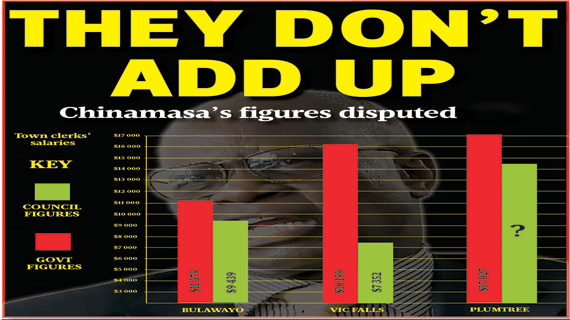
THE salary of Bulawayo town clerk Middleton Nyoni announced by Finance minister Patrick Chinamasa last week differs significantly from the schedule council submitted to the government, Southern Eye can reveal.
SILAS NKALA/ Richard Muponde
Chinamasa told journalists in Harare that Nyoni earns $11 379 a month as he announced that salaries of all town clerks had been slashed to $6 000.
But the salary schedule obtained by this paper before the minister’s announcement shows that the town clerk, who is among the lowest paid in the country, earns $9 439,10.
The package is broken down into a basic salary of $5 182, transport allowance ($946,43), housing allowance ($518), telephone allowance ($29) and other cash allowances ($2 763,56).
Other council directors earn $8 000 and below.
Plumtree, Victoria Falls and Masvingo are some of the other local authorities that have queried Chinamasa’s figures, throwing into doubt the government’s stance that it has solved the skewed salaries in its departments and companies.
- Chamisa under fire over US$120K donation
- Mavhunga puts DeMbare into Chibuku quarterfinals
- Pension funds bet on Cabora Bassa oilfields
- Councils defy govt fire tender directive
Keep Reading
Davis Dumezweni Luthe, the Plumtree town secretary, was said to be earning a total monthly package of $17 027 consisting of $1 173 basic salary and $15 854 in allowances, meaning that his benefits constitute 93% of his remuneration.
But the border town’s chairperson Paulos Hobane rejected the figure Chinamasa released saying it came as a shock to them.
He said that was not the figure the municipality forwarded to Local Government minister Ignatius Chombo when he demanded local authorities’ pay schedules.
Hobane said Luthe’s total remuneration was around $5 000 and he did not know where Chinamasa got the $17 000 figure he released last week.
“The figure does not go along with what we know. It’s not what we sent to the minister (Chombo),” he said.
“Maybe they calculated it using free benefits he gets such as a council house, fuel and school fees.
“Even if they calculated it that way, the figure does not amount to that.”
Chinamasa even poked fun at Luthe when he announced the government findings saying he could tell people in a bar that he earns $1 000 when he actually got $17 000 hidden in allowances.
Meanwhile, Bulawayo mayor Martin Moyo yesterday said the slashing of municipal executives’ salaries would trigger a serious brain drain that would impact heavily on service delivery if the process was done impulsively.
Although Moyo declined to be drawn into figures released by Chinamasa, he said Bulawayo was the least paying local authority and they were in the process of negotiating improved salaries for management.
“In general, we are the lowest paying local authority and we were negotiating upwards,” he said.
“If Plumtree and Gwanda town clerks get something above ours, why should Bulawayo remain far below them?
“We need to rationalise these salaries and the planned reduction of salaries for council managers and directors would trigger a serious brain drain if done impulsively.”
Moyo said as far as his council was concerned, they had not received any directive to reduce salaries.
“I don’t think that it is right for the government to impose the new salary structure on local authorities,” he said.
“There is an adage which says ‘you pay peanuts you attract monkeys’.
“If the government imposes the announced salaries, I don’t foresee the best brains remaining in jobs.”
Moyo said people currently holding the posts were highly qualified and went through rigorous interviews.
“Salaries and working conditions are negotiable and all these are included in their contracts,” he said.
“When negotiating down their salaries, there must be a value study so as to come up with justified figures, otherwise we will lose good brains if low salaries are imposed.
“I don’t think the $6 000 suggested salary is researched.
“I think it is someone who thinks that it is OK and we cannot expect proper service delivery if people get such an amount.”











